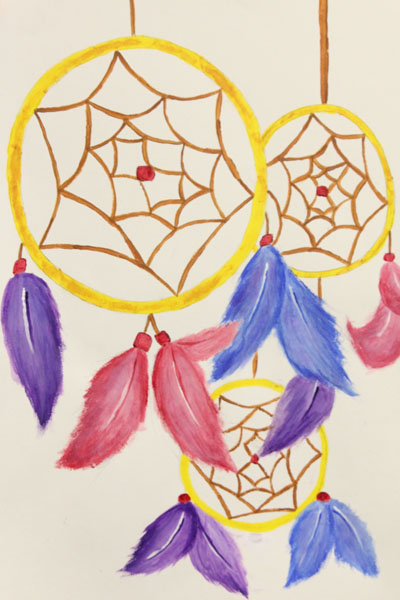Imagine you are running through a maze and you find yourself lost in its twists and turns. It seems as if you are only going in circles. Suddenly, you wake up and realize it was all a dream.
Psychoanalyst Ryan Allison, M.A., uses the dreams of his patients to help them work through problems they are experiencing.
“The main reason we dream is to work through things,” Allison said. “We use [dreams] to condition ourselves for different tasks that we may need to perform. [Dreaming is] the mind’s way to prep us for those types of things.”
According to Allison, although people may experience common themes in their dreams, they may mean different things depending on what is going on in an individual’s life.
“[What you dream about] is up to what is happening in your life and what your conscience has processed as important,” Allison said. “It will be up to each individual; everyone is different.”
For some, the meaning of their dreams is obvious.
Junior Paige Brady often thinks about the importance of good grades and college decisions, thoughts which her dreams tend to reflect.
“I dream about school a lot,” Brady said. “I get dreams about graduating and going off to college and being separated from my family and how much my life [will change] when I’m in college.”
For others, the meanings of their dreams are not as clear. Senior Juliana Ayala had a dream on Friday, Nov. 9 about an unfamiliar family that had previously given their child up for adoption and was trying to get the child back by killing the mother who had adopted him.
In Tony Crisp’s “Dream Dictionary,” kidnapping someone else means influencing someone against their will or forcing yourself to do something against your feelings. Ayala feels the meaning of this dream applies to her in real life.
“It’s kind of funny because the kid that was kidnapped was my boyfriend,” Ayala said. “[Earlier that evening,] I was trying to make [my boyfriend] take pictures with me but he wouldn’t … [and] I was trying to force him to do it.”
Although Ayala found humor in her dream, other students often have differing reactions upon waking up.
According to Allison, nightmares come as a result of an individual working through a problematic situation, and a nightmare’s scary images are a reflection of that.
Junior Natalie Beashore has had nightmares since she was young, though they have gotten more violent as she has gotten older.
“I’ve had the same [dream] over and over again but the one that comes to mind is a few of my friends, my sister and I falling into lava,” Beashore said. “The screams and burns make me a little frantic.”
Although she is usually able to distract herself from her nightmares upon waking up, they will sometimes startle Beashore the next day.
“I try to not think of my nightmares but occasionally the one from the night before will run across my mind during the next day and my heart picks up its pace,” Beashore said.
Beashore has also had more terrifying experiences while sleeping.
“I’ve had sleep paralysis, which is where you’re awake but you’re also in a dream,” Beashore said. “My sister and her friend … said I was shaking and screaming. I just remember not being able to move and trying to scream for help.”
For Brady, in addition to college dreams, reoccurring nightmares are common, as she has them once or twice a week. Her nightmares usually include a family member dying.
“I have dreams about my dad getting in a plane crash [because] he flies when he’s going out of town,” Brady said. “[The dreams are] always around that time.”
Because dreams often occur as a result of someone working through a problem, Allison said it is common for certain themes in dreams to be repeated.
“Typically, we are going to have repetitive dreams if there is some latent unconscious conflict that has not been worked through,” Allison said. “What happens is the mind disguises that material … then presents the disguise in symbolic form in the dream for the [mind] to work through.”
Brady also has reoccurring dreams revolving around past events in her life.
“I also have a lot of nightmares about things that have happened in my past, but [those things] become more severe in the nightmare,” Brady said.
Sophomore Rebecca Dixon has noticed that many of her nightmares repeat themselves.
“I always have a dream about being lost in apartment complexes,” Dixon said. “It’s like a maze and I’m being chased with a gun.”
Being lost in a dream could mean confusion or the inability to make clear decisions, according to Crisp’s “Dream Dictionary.”
“[The dream occurs] when I’m trying to make decisions,” Dixon said. “Even when my parents are deciding on stuff, I have that dream.”
A more unusual aspect of the subconscious is lucid dreaming, in which the person is aware that they are dreaming. They are also often able to manipulate the events of their dream.
Sophomore Valerie Nguyen has had several lucid dreams.
“[In my dream] I was sitting on my bed and I looked at my clock and it said ‘00:111’ … [and that is when] I realized I was dreaming,” Nguyen said. “[After I realized that], I could control the things that I was doing in my dream.”
Nguyen said she was introduced to the idea of lucid dreaming from a video she watched with her aunt. They both decided to see if they could lucid dream.
“[According to the video], there are ways of training yourself,” Nguyen said. “You have to lie really still in bed when you’re falling asleep. Check your hands constantly, or a clock. If they look funny, you’ll know you’re in a dream.”
Studies are still being done on lucid dreaming, but no one is entirely sure of what causes it.
Other odd occurrences that may take place if you are between consciousness and unconsciousness include sleepwalking.
“Sleep is not just a psychological phenomenon; it is also a physiological phenomenon,” Allison said. “If consciousness isn’t fully locked in, then an unconscious process … occurs that will make them start to walk.”
Senior Bailee Dollard has experienced sleepwalking before.
“When I was little … I used to sleepwalk,” Dollard said. “[I knew because] we had cats and had a shock mat so they wouldn’t scratch the couch. I would … walk around [and] stand on it, and then go in my parents’ room complaining about my feet hurting.”
Although the unconscious mind is not fully understood due to its complexity, there are still studies being conducted to gain a better understanding of what causes us to dream and what our dreams can represent.








